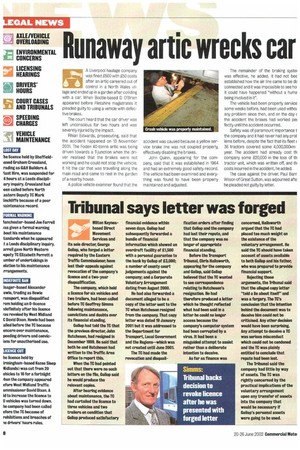Tribunal says letter was forged
Page 18

If you've noticed an error in this article please click here to report it so we can fix it.
Milton Keynesbased Direct Movement Services and its sole director, George Gallop, who forged a letter required by the Eastern Traffic Commissioner; have lost their appeals against revocation of the company's licence and a two-year disqualification.
The company, which held a licence for six vehicles and two trailers, had been called before IC Geoffrey Simms following maintenance, convictions and doubts over its financial standing.
Gollop had told the TO that the previous director, John Hutcheson, had resigned in December 1999. He said that both he and Hutcheson had written to the Traffic Area Office to report this When the TO had pointed out that there were no such letters on the file, Gallop said he would produce the relevant copies.
After hearing evidence about maintenance, the TC had curtailed the licence to three vehicles and two trailers on condition that Gollop produced satisfactory
financial evidence within seven days. Gollop had subsequently forwarded a bundle of financial information which showed an overdraft facility of £1,900 with a personal guarantee to the bank by Gallop of £3,000; a number of county court judgements against the company; and a Corporate Voluntary Arrangement dating from August 2000.
He had also forwarded a document alleged tube a copy of the letter sent to the IC when Hutcheson resigned from the company. That copy letter was dated 19 January 2001 but it was addressed to the Department for Transport, Local Government and the Regions—which was not created until June 2001.
The TO had made the revocation and disquali fication orders after finding that Gallop and the company had lost their repute, and that the company was no longer of appropriate financial standing.
Before the Transport Tribunal, Chris Hallsworth, appearing for the company and Gollop, said Gallop believed that the TO wanted to see correspondence relating to Hutcheson's resignation. He had therefore produced a letter which he thought reflected what had been said in a letter he could no longer access because the company's computer system had been corrupted by a virus. It had been a misguided attempt to assist rather than a deliberate intention to deceive.
As far as finance was concerned, Hallsworth argued that the IC had placed too much weight on the existence of the voluntary arrangement. He said the IC should have taken account of assets available to both Gallop and his father, who was prepared to provide financial support.
Rejecting these arguments, the Tribunal said that the alleged copy letter "told a lie about itself" and was a forgery. The TC's conclusion that the intention behind the document was to deceive him could not be criticised. Any other decision would have been surprising. Any attempt to deceive a IC was serious misconduct which could not be condoned and the IC was plainly entitled to conclude that repute had been lost.
The Tribunal said the company had little by way of assets. The TO was rightly concerned by the practical implications of the voluntary arrangement upon any transfer of assets into the company that would be necessary if Gollop's personal assets were going to be used.
























































































































































